O! what Man will do fore a Rime!
Self-proclaimed bibliophile, culture nut and nerdfighter. English lit. and linguistics geek. Future career in publishing.
The Iliad by Homer

The majestic king of Troy slipped past the rest
and kneeling down beside Achilles, clasped his knees
and kissed his hands, those terrible, man-killing hands
that had slaughtered Priam's many sons in battle.
- Book 24: Achilles and Priam
ll. 559-562, p. 604
Warning: Large amounts of spoilers below. If you know nothing about Greek history, Western history, Greek mythology or the events of the Trojan War, you will be spoiled. If you know a bit about the above but have never read The Iliad, you will be spoiled. If you don't want to be spoiled, go read The Iliad and learn about classical Western history because it's really interesting, like all things where history records are obscure.
The Iliad is about the Trojan War between the Greeks (then called Achaeans) and the Trojans after Paris, a Trojan prince, takes Helen from her husband Menelaus, king of Sparta. The poem begins when Achilles decides he will no longer fight with the Achaeans until Agamemnon, king of Argos, returns his captive Briseis. Agamemnon says no, so Achilles and his Myrmidons do not participate in the battles until she is returned to Achilles. The poem ends with Priam, king of Troy, taking Hector's corpse back to Troy to be buried. The time span of the poem is roughly a few weeks out of the war and the events are supposed to occur during the last year of the war, with it having gone on for ten years previously.
Make no mistake: this is a poem about war, so that means we are getting a lot of battles. There is at least a battle every book (the "chapters" of the poem are separated into 24 books) for the most part and they are consistently bloody. People are being disemboweled, having spears run through their necks, being decapitated or having their heads bashed in. It's pretty gruesome, and yet the language that Homer, and through translation Fagles, uses is poetic in its elegance; the injuries and deaths described don't come across as disgusting, but have the effect of making everyone seem courageous and strong.
Achilles as a character is probably one of the most popular Greek heroes today. People name their dogs after him, Brad Pitt famously played him in that terrible but still enjoyable movie Troy, and the majority of people in the West know who and what Achilles is famous for. People think he's the shit, and technically in the scope of The Iliad he is. He's unmatched in fighting prowess, his armour is the best and he's a great leader. He also has an unmatchable temper -- not even Agamemnon could match it, and they're both petty as hell. Most of The Iliad has no Achilles fighting, until probably four books from the end, because his temper is so intense that he was angry that entire time. Multiple chill pills needed to be taken.
Another thing that will surprise people who haven't read the text and have only encountered the story through our culture will be the complete lack of honour these guys show to the other side. When Hector is killed, the rest of the Achaeans go up and stab his corpse and then taunt it. I'm not kidding. They all go up and say, "Ha, not such a bigshot now, are you?" (or something to that effect) as they each stab him with their spears. Achilles then spends a week or so dragging his corpse around from his chariot. Patroclus kind of gets the same treatment earlier in the poem. His body is stripped of Achilles' armour and the Achaeans and the Trojans kind of do a little tug-of-war with his corpse. Like, what?! That is just not a nice thing to do to a dead person.
Probably the last really surprising thing is the appearances of the Greek pantheon. They are literally everywhere, fucking up shit. A large part of The Iliad is that Hera and Zeus are having another marital spat and so support opposite sides of the war; Hera wants the Achaeans to win, Zeus wants the Trojans to win. Both get other gods and goddesses to help their sides and fight each other. Athena completely dominates Ares and then essentially rapid-fire punches Aphrodite in the tit. It's amazing. The gods and goddesses also help out the men by redirecting arrows and spears, physically manifesting to literally give them a hand, and by manipulating nature so that there's a heavy mist or stopping the flow of the river, etc. They kind of steal the show.
Unsurprisingly, the women get the least amount of screen time (metaphorically). This is a war and I think it's pretty valid to say that women in Western canon at this point in history were not participants but spoils of war. The famous Helen gets a fair amount of time for a female character, but it's more like, "This guy looks like he can deffo beat someone up. So does this guy. I think Troy's got this." Andromache probably has the most appearances in the text, but solely as a reaction to Hector's death and subsequent funeral parade. There's a lot of "Woe is me! I can't believe Hector would die and leave me and my baby to those nasty Achaeans!" Hector's mother also gets some time to mourn and speak a bit. Briseis actually has a couple things to say, but like Andromache they only happen in response to Patroclus' death. In fact, I don't think Briseis actually says anything to Achilles.
(I want to take this moment for all of us to appreciate that Briseis is a gorgeous name, both aesthetically when you look at the spelling and the original and bastardized pronunciations. Also, in the text, she may have been a captive but she and Achilles were going to wed once the war was over, but then again Stockholm Syndrome. Either way, Briseis is actually an interesting character. I would love to see a telling of these events from her point of view à la Wide Sargasso Sea. I also want to point out that Andromache is a badass name.)
The most notable thing about The Iliad is that you can tell it was an oral story before Homer wrote it down. There are a lot of repetitions, especially when mentioning characters' names, and sometimes seems redundant. There is one scene where Zeus tells Iris to tell Priam "x" and Iris tells Priam "x" word-for-word what we just read. I actually don't find those bits annoying like I'm sure other readers might, because it just makes my linguistics-senses tingle. It impresses me more than anything. I can't personally imagine remembering a poem that is thousands of lines long and tells such an important historical event, despite the Trojan War's historicity being widely debated. There's also some great foreshadowing used in regards to Achilles' impending death.
Great, interesting poem that is never dull. Sadly, there is no Trojan horse, but we can't have everything.
The Tempest by William Shakespeare

I boarded the king's ship: now on the beak,
Now in the waist, the deck, in every cabin,
I flamed amazement
- Ariel, The Tempest
1.2.227-229
The Tempest has been in my top five Shakespeare plays ever since I read it; in fact, I think it's probably my second favourite, behind Henry V. The play is about a usurped Duke of Milan, Prospero, who is stuck on an island in the Mediterranean with his daughter Miranda, and the havoc he causes when he shipwrecks a ship with the king of Naples and his men.
Oh, man. I love everything about The Tempest. It's funny (like, qualitatively and quantitatively funny), has lots of depth (emotionally), has great plotting, follows decorum (Ben Johnson would love this play!), has absolutely fantastic characters, and has a wonderful magical feel overall.
First off, the funny parts. Trinculo, a jester, and Stephano, the king's butler, basically get shitfaced in their first appearance (probably before that, actually). They are separated because of the wreck, but end up stumbling into each other with Caliban (the "original" inhabitant of the isle) as mediator. Their reunion is full of confused drunkards being confused, so obviously it's hilarious. Every time they appear in the play, it's a moment for Shakespeare to exercise how witty he is -- and it's awesome. There are jokes left, right and centre with these two and adding Caliban in the mix just makes it weirder and funnier.
This play is full of great characters. If Trinculo and Stephano weren't enough to persuade you, Ariel should. He's a little spirit that Prospero controls (and won't free even though he promised Ariel his freedom like a year ago, damn it) who constantly outdoes what Prospero tells him to do. Cause a shipwreck? Ariel makes it the worst thing ever. Spy on Caliban? Ariel causes confusion for Caliban, Stephano and Trinculo. Wake up the king of Naples and co.? Ariel sings them the cutest songs. He's basically just the best thing ever.
The next best thing is Caliban. I think Caliban is such a great character that I want to name an English Mastiff after him. He's the "original" inhabitant of the island in the sense that he was born on the island and Prospero took control of the island when he arrived, but Caliban was never an aboriginal: his mother was an immigrant. However, he represents the entire colonization debacle that was happening when Shakespeare wrote this play -- England had just arrived in the New World a couple years earlier. So it's tough to say if Caliban's character is a pro- or anti-colonization argument since the English public never really got into that kind of sentiment until much further down the line. Caliban is also interesting because he is very vulgar most of the time, but has the ability to be eloquent and kind. It's all a bit of "Was he born this way or was he made this way?" (Caliban's mother, Sycorax, was a bad witch and Prospero enslaved him, so.)
Shakespeare actually follows decorum in this play (for once, I know!). That means we get a play where the timeline is equal to the duration of the play. Nowadays we're used to going between locations, as Shakespeare does in Antony and Cleopatra, and skipping forward and backward through time, but that's just not what you do in classical drama. Sophocles would have not be down with that, and because Johnson was such a classicist he was not cool with it either. Normally I like my timelines fairly wibbly-wobbly and my scenes to be all-over location-wise (well, not so disjointed, but you know what I mean), but the straightforward classical style really works for The Tempest. I think it would be much too hard to follow if it were otherwise because there is just so much going on in this play. (And I'd rather not have another King Lear.)
I could gush on and on about this play since I love it so much. However, I'm just going to end this review with this: this play is gorgeous in setting, themes, dialogue and characters. It's so magical and so poignant that I personally think it's better than A Midsummer Night's Dream.
The Book Thief by Markus Zusak
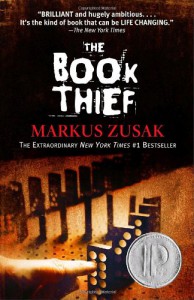
They're strange, those wars.
Full of blood and violence -- but also full of stories that are equally difficult to fathom. "It's true," people will mutter. "I don't care if you don't believe me. It was that fox who saved my life," or, "They died on either side of me and I was left standing there, the only one without a bullet between my eyes. Why me? Why me and not them?"
- The Book Thief
p. 174
The Book Thief is about a ten-year-old German girl who is placed in foster care in the town of Molching, near Munich, during World War II. While in foster care, her foster father teaches her how to read and write after finding out she stole a book. The novel follows her through her time in Molching, from 1939-1943.
Zusak gives us the story of an ethnic German girl rather than a Jewish girl. He figures we've read enough stories about the suffering of Jewish people during the Second World War, and he might be right, I don't know. It is a nice refresher, though, to have a story about the so-called "enemy". I know that many Germans looted the homes of Jewish people once they'd been taken and that no one really did anything to stop the Nazi Party. We can all kind of look back on that time in history as citizens of the Digital Age and wonder how no one could have stopped them. But that's looking for an answer that human psyches can't really provide. We've seen the Stanford Prison Experiment, the Milgram Experiment and the Bystander Effect, and guess what? People like to say that they'd do more in retrospect but no one would. Is that depressing? Maybe, but it's true.
So what does this have to do with The Book Thief? Our protagonist, Liesel Meminger, is both the bystander and the one to intervene. (She doesn't really have anything to do with either SPE or the Milgram Experiment, but those are important for the events of WWII and more, so they are relevant.) Liesel, like so many other German characters that we get in this book, stands by as the Nazi soldiers parade the Jewish prisoners through their town to Dachau. Unlike so many others, Liesel actually grows as a character and as a person so that we can see her shrug off the apathy and actually engage, much like her foster father, Hans Hubermann.
I just think that this novel works well and on so many levels: showing us "ordinary" lives of the civilian Germans, that despite being the aggressors they are still regular people with lives and they're just trying to get by on the tail-end of the Great Depression; bringing a reminder that there were German citizens who hid Jewish people from the Nazis; and putting a spotlight on how war devastates. And I can't forget the bibliophilia that is present throughout!
However, I did find so many issues with the writing that this book could never make it to five stars. The novel is narrated by Death, which is fine and all that, but his own philosophical pondering and
***CAPITALIZED TITLE***
There is something that
I (Death) find interesting
in this little blurb.
You as a reader
might not.
really broke up the flow.
There were also parts where I sincerely thought the copyeditor had fallen asleep. Just look at the quotation I used for the beginning of this review: "It was that fox who saved my life" (emphasis mine) -- "who" is only used for people, never animals. Maybe it's the grammarian in me, but that's just not correct usage; and maybe it's the linguist in me, but I've never heard or seen someone use "who" in that manner (until now, clearly). The most common way is to use "that". There are other instances where the verbs didn't match with its antecedent, logically. I would love to just say, "Poetic language! Metaphor!" but that's not how it works. When I have to take a some time to actually decipher what you're trying to say and it's not an actual poem, then we have a problem.
Besides the writing issues I had, I found the rest of The Book Thief to be quite enjoyable and heart-tugging. I think Zusak created some lovely characters (most notably, Rudy Steiner, Hans Hubermann and Ilsa Hermann), even if I think some of them do fall flat. I also think that Zusak manages to keep you interested despite going through four years of Nazi Germany and not much happening. He can really write childhood scenes.
Almost certainly not the best fiction that I've read on the Holocaust or World War II, but still worth the read and enjoyable. I especially recommend it if you are already a fan of Zusak's.
I Am the Messenger by Markus Zusak

In the echoes of light in my lounge room, I let my fingers hold the card gently, as if it might break or crease in my hands. Three addresses are written on it in the same writing as on the envelope. I read them slowly, watchfully. There's an eeriness slipping over my hands. It makes its way inside me and travels, quietly gnawing at my thoughts.
- I Am the Messenger
p. 25
Warning: Spoilers down under. (Haha, get it? Because they're in Australia and Zusak is Australian? Oh, bad puns.)
I Am the Messenger is about a young man (19) who begins receiving aces in the mail after stopping a bank robbery. These aces have clues on them that our protagonist, Ed Kennedy, must figure out in order to move on to the next ace.
This book was witty, clever and humorous. Ed, his friends and many supporting characters were just a bunch of fun to read because of their sarcasm, snark and sass. While it does make them fun, it also doesn't make sense in terms of their intellect: Ed and co. snark the gunman of the bank robbery, who -- I will repeat for sake of emphasis despite redundancy -- is wielding a gun! I don't care how incompetent or useless you say this gunman is, you do not snark someone with a loaded gun. Common Sense 101, guys.
Aside from their foray into stupidity, the rest of the book had some interesting stories courtesy of the aces. I liked the little clues, despite them not being very mysterious or overly complicated in their solutions. I also liked the way Ed dealt with them, tailoring each solution to each problem.
His friends were also interesting, when we eventually got to look at them head on for once. It kind of makes you think about how well you can know anyone, just based on what they don't want anyone to know (I'm talking about you, Marv). But then it also makes you wonder, how great of friends are they if they didn't even know that much about each other or couldn't say these things to each others' faces before the ace? What does this say about Ed as a friend? I don't really know.
But I do know that Ed as a friend in relation to Audrey is a terrible one. He's constantly harassing her with his feelings of love even though she's said she doesn't see him that way, whines about it to us as readers like every time she's mentioned in the book, and is always second-guessing her decisions for her. Great job, Ed. Just because you've been friendzoned doesn't mean it's Audrey's fault, it means it's your fault for not getting over her after ~3 years of nonreciprocation. I genuinely wish this book had focused on getting Ed over his unrequited love because, at this point, why would Audrey still want to be friends with him? Unsurprisingly, no dice, and the good guy (Ed) wins in the end (or wears Audrey down? Hmm).
I also find the ending to be a hit-and-miss with me. I wanted the mystery sender to be someone totally different, but it turned out to be a joke (in the sense that you'll get it once you read it, not in the "it was terrible" sense). I admit, it did make me crack a smile, but ultimately wasn't fitting with the story that had come before. It felt so out of place and wrongly integrated.
Oh, well. Still an enjoyable read.
30-Day Book Challenge (Day 29-30)
Happy Halloween! I'm doing these two days a bit late, but whatever.
Day 29
A Book Everyone Hated But You Liked
Beatrice & Virgil
Yann Martel

Reasons: A lot of people didn't like this book, especially since it was a bit of a letdown after Life of Pi. Yeah, I didn't think it was as good either, but I really liked it for some reason. I don't know why exactly;
(show spoiler). Maybe I need to re-read it to see if I still like it? Sometimes opinions change.
Day 30
Your Favourite Book of All Time
Never Let Me Go
Kazuo Ishiguro

Reasons: I really hate these kinds of categories. I might have read a book that I thought was my favourite of all time when I read it, but then I haven't picked it up again in six years (I often don't re-read books because I can always remember their plots generally very well and don't feel that I need to re-read them). Does that really count? I picked this book based on my memories of reading it and how much I enjoyed it. I still think it's an amazing book even though I haven't read it since the very first time, about four years ago. It also has one of my favourite covers; it's so beautiful! Other contenders were: Jane Eyre by Charlotte Brontë, The Amazing Adventures of Kavalier and Clay by Michael Chabon, Cloud Atlas by David Mitchell, The Bell Jar by Sylvia Plat, The Great Gatsby by F. Scott Fitzgerald, Battle Royale by Takami Koushun, The Hobbit, or There and Back Again by J. R. R. Tolkien, The Jade Peony by Wayson Choy, Lolita by Vladimir Nabokov, White Teeth by Zadie Smith, and a whole bunch more. (See what I mean about this category?)
30-Day Book Challenge (Day 28)
Day 28
Favourite Title of a Book
Do Androids Dream of Electric Sheep?
Philip K. Dick

Reasons: So many to choose from, and while I do like others, like a lot a lot, I just picked this one because I read it recently. But, yeah, look how great of a title that is! It's all philosophical, science fiction-y and shows you what kind of world you'll be reading about.
By Blood by Ellen Ullman

And immediately a chasm opened between the patient's last words and those still to come.
Was the woman named Michal Gerson truly her mother? What was my evidence? Initials. A date. Historical patterns. Almost nothing.
The laughing voice of Mrs. Knobloch mocked me: Who am I to tell you what to believe?
- By Blood
chapter 67 (part 2)
Warning: There be spoilers below, yargh.
By Blood is about a professor who moves to San Francisco during the 1970s because he did something bad at the university where he worked (but we don't actually figure out what) and so is put on leave. He rents an office in a building where the walls are paper thin (like, rice paper thin) and overhears the therapy sessions of a young, adopted lesbian next door. So, like the creep he is, he eavesdrops and becomes obsessed with her quest to find her birth mother.
Sounds pretty great, right? Wrong.
By Blood was obscenely boring. It should be illegal to have a book this boring. That's a bit of lie; it's only the first two parts of the book that are practically insufferable to sit through. That's why it took me almost six months to finish. The story does pick up once we get to the third part, so it was a bit of a relief. Overall, it was a very dry and tedious read.
As for characters, our protagonist is beyond creepy and is bordering on the stalker edge. Okay, he doesn't actually know what the patient looks like, but he knows where she lives because of snooping and he's obsessed with hearing her confidential sessions with the therapist. He constantly calls her "[his] dear patient" in a not altogether paternalistic way. It's a bit frightening. He is also very judgemental of the therapist because of her German-ness and because of his hatred of therapists -- yet, he still listens in.
In fact, the protagonist is less of a real character and more of a narrative frame. Ullman uses the professor as the vehicle through which we hear of the patient's story. Unfortunately, this narrative frame doesn't work: there is too much focus on the patient's story to actually make the professor a useful narrative device; instead he just gets in the way, especially when interjecting the story with pointless and disruptive asides. They don't make the story flow better and they certainly aren't interesting.
The more clever narrative frame that Ullman uses is in the third part, when we have the main story told through a tape recording. Now that is much more interesting and unique, and it gives the story a bit of tension and intrigue.
Back to the professor, besides being a very flat character, he's also a character where you wish you weren't in his head. He's blatantly creepy in his thoughts, is obsessive in an I-will-kill-you-so-that-no-one-else-can-have-you kind of way and loves to regale us with how "titillating" something was or how hearing about the patient's lesbian encounter made him get an uncomfortable boner at his desk. I never want to hear the word "titillating" again; it has been tainted.
The other characters we get are the patient and the therapist, with a bit of adoptive parents and birth mother thrown in as anecdotal evidence. The patient was almost a cardboard cut-out herself despite Ullman trying to make her unique by being a lesbian. In the end, the patient's lesbianism seemed to only be there to catch the professor's attention (because he wouldn't listen in to just any non-LGBTQ patient, now would he) and so that Ullman could write a lesbian porn scene (which we then had to suffer through the professor's "Oh, yeah, tell me more, baby" crotch-grind reaction). True, her lesbianism was also there so that the patient and her adoptive mother could have a contentious relationship, but it really didn't seem properly thought out or integrated with purpose.
The therapist is definitely a cardboard cut-out: she's German and her father was a Nazi, which she feels guilt over even though she was in America and had nothing to do with it. So, just like every other German who had a family member in the Nazi party after the war ended.
The actual mystery and plot did turn out to be fairly interesting once we get to part three and find the birth mother, although I would argue that the mystery is not very mysterious. Essentially, this is no Agatha Christie or Sherlock Holmes mystery. Having to read about the Jewish people surviving in Europe during the Nazi regime is always interesting, no matter who writes it, really.
However, there are some issues that I have with a bit that was tacked on to the end: Lebensborn. World War II history buffs and a lot of other people know what Lebensborn is, but it only gets like five pages of coverage in the book even though it was a large plot piece for the birth mother. It felt like Ullman just discovered it during her final draft and thought it was neat bit of history, so she threw it on the end there. It didn't work, felt out of place in its placement and felt like an afterthought. If this secret Nazi project was so important to the patient's birth history, what is the point of adding it on at the very end? It just didn't work for me.
I do think Ullman can write some nice prose at times, and when she's having the birth mother recount her experiences it's a joy to read. Sadly, Ullman can also be very dry with her prose, so I guess it balances out.
Not the first person to tackle the Holocaust and Jewish people in Europe during the Nazi regime, and I don't think she tackled it as well as others have. By Blood, though, is still a fairly enjoyable read once you suffer through the first two parts and eventually stop weeping about the professor's incessant nattering and creepiness.
30-Day Book Challenge (Day 27)
I couldn't definitively decide on one, so this post has two choices. Don't worry; I didn't spoil anything.
Day 27
The Most Surprising Plot Twist or Ending
A Storm of Swords
George R. R. Martin

Reasons: I think the words "Red Wedding" are enough.
Londonstani
Gautam Malkani
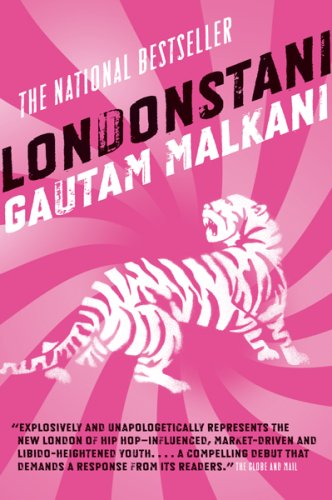
Reasons: I've seen some reviews where people have said that they guessed the ending ahead of time and so weren't surprised, but I definitely was. Maybe I'm just an oblivious reader?
King Lear by William Shakespeare

I pray, weep not:
If you have poison for me, I will drink it.
I know you do not love me, for your sisters
Have, as I do remember, done me wrong:
You have some cause, they have not.
- Lear
King Lear
4.6, ll. 75-79
Warning: This review will be spoiler heavy and I'm not using the spoiler cut tags. If you haven't seen, read or even heard about King Lear, read my review at your own risk.
King Lear is about a king who decides that he's done with the performative side of being a king and chooses to split up his kingdom for his three daughters to inherit. Unfortunately, the one he loves best (Cordelia) is unable to say what he wants to hear and so she is ousted from the kingdom and disowned. The other two sisters seek to gain more power and end up terrorizing the king and reducing him to madness.
This is quite possibly Shakespeare's most tragic play because of the injustices that happen to a bunch of different characters. However, I also think it's one of his hardest to read, analyze and even understand. The plot is quite convoluted and is a bit draining when trying to read because so many things are referred to in passing or in one line, so it's kind of hard to pay attention. The reasoning behind Lear's mental break is never fully revealed (that I saw), in comparison with Edmund's diabolical plot. Goneril and Regan are very unlikeable characters in their conniving ways, but their true purpose is still unclear to me. What is the point in tormenting an old man, especially one that is their father, when they (well, technically their husbands) have all the power?
The true tragedy of the play is in the separation of Lear and Cordelia, and Cordelia's subsequent death. From the beginning, it's fairly evident that Lear's favourite daughter is Cordelia; no one, not even he, denies this. But the fact that she can't tell him in front of the court how much she loves him is such a sticking point that I can't believe he really knows his daughter at all. Despite her being his favourite, he doesn't seem to know how she really feels: it's obvious she loves him, she's just not great at flashy speeches with no substance like her sisters are. That Lear could be so unnerved by her refusal to vocalize her love for him is really his own fault, especially when he's so quick to believe Goneril and Regan who don't really say much other than "I love you so much, you're the best, I love you a lot" and "I love you more than her," respectively.
I think Cordelia's death hits home a lot harder than the others because of Lear's reaction: his favourite daughter just died in front of his eyes after he'd recently reconciled with her. Then, he dies from heartache. Can you say my tear-ducts are working overtime? I like Shakespeare's focus on familial love here; it's more effective than a romantic love like we see in Romeo and Juliet. The reason is because familial love is more at the core of a human being in my opinion (though, for some families, it's just not possible) and I'm sure many people want that sense of security, warmth and community that is associated with it. That's why I think King Lear is so tragic.
What I can't get behind is the lack of true motive coming from Goneril and Regan, and even Edmund (yeah, Gloucester is an asshole to him, but Edgar doesn't seem to have done anything wrong). There's also the difficulty with following Lear's mental breakdown and the force of his anger. It's so hard to read when the poetry is so flowery. True, Lear rips new ones into Cordelia, Goneril and Regan, but the speeches are so well thought-out that it doesn't even look like it's out of irrepressible rage.
Shakespeare follows decorum too well for this tragedy to really be more than just a ball of sadness (but Ben Johnson would be happy!). It's court plots and evil plans feel like they're thrown to the wayside in favour of the tear-jerking moments and so it's hard to understand because they're not developing enough.
Perhaps this is one of those plays that is most certainly much better suited to the stage.
30-Day Book Challenge (Day 18-26)
Because I haven't been keeping up with these (uni is time-consuming, okay!), I have 9 days to cover. Oh, God. I'm so, so, so sorry.
Day 18
A Book that Disappointed You
The Name of the Star
Maureen Johnson

Reasons: A murder-mystery that involves boarding school, London, Jack the Ripper and ghosts? I was so sure that I would love this, but I really didn't. So disappointing because I didn't find the romance intriguing, the mystery was pretty blah and the plot seemed to lose its way throughout. Also, the ending was a bit of a letdown for me.
Day 19
Favourite Book Turned Into A Movie
Life of Pi
Yann Martel
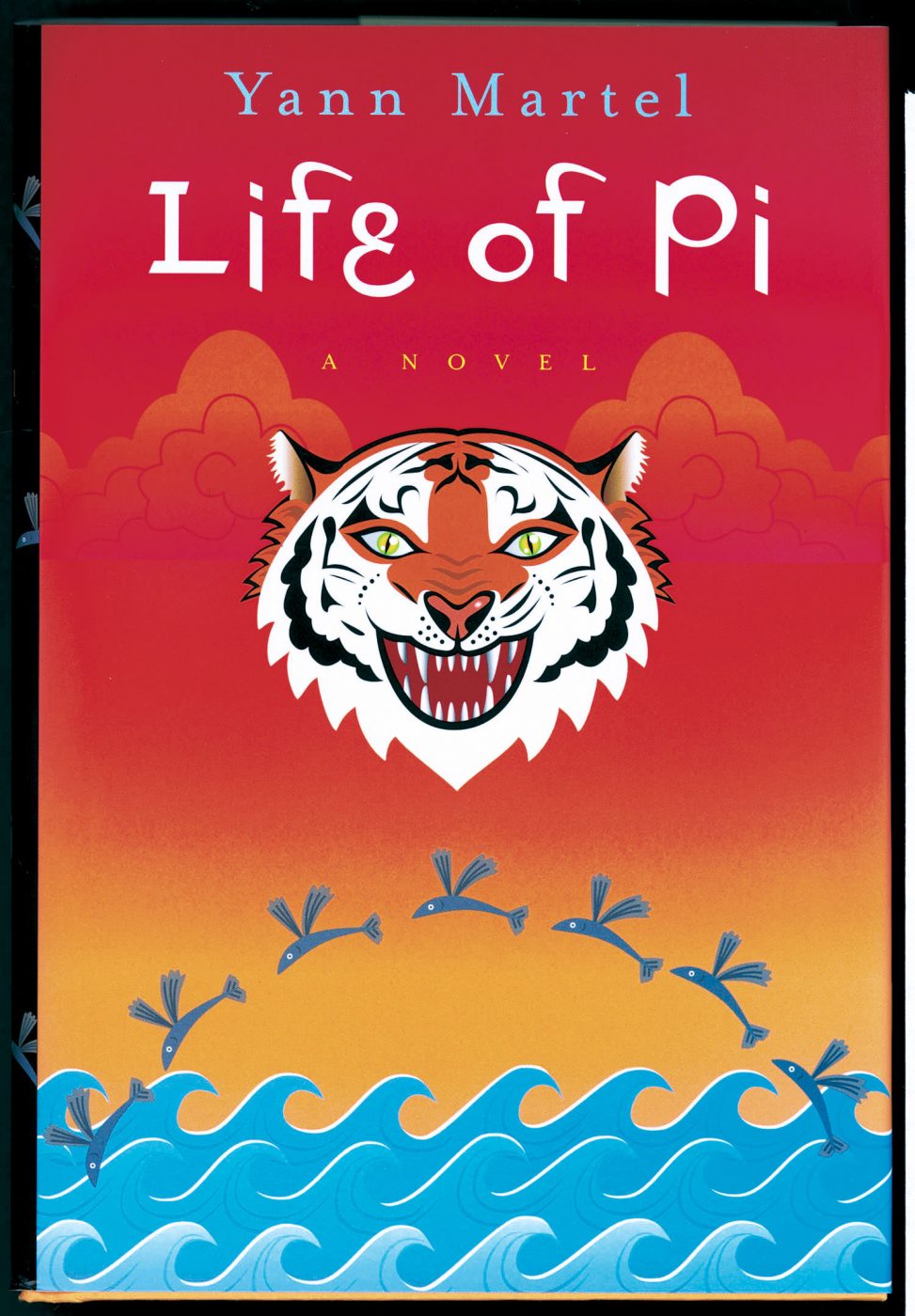
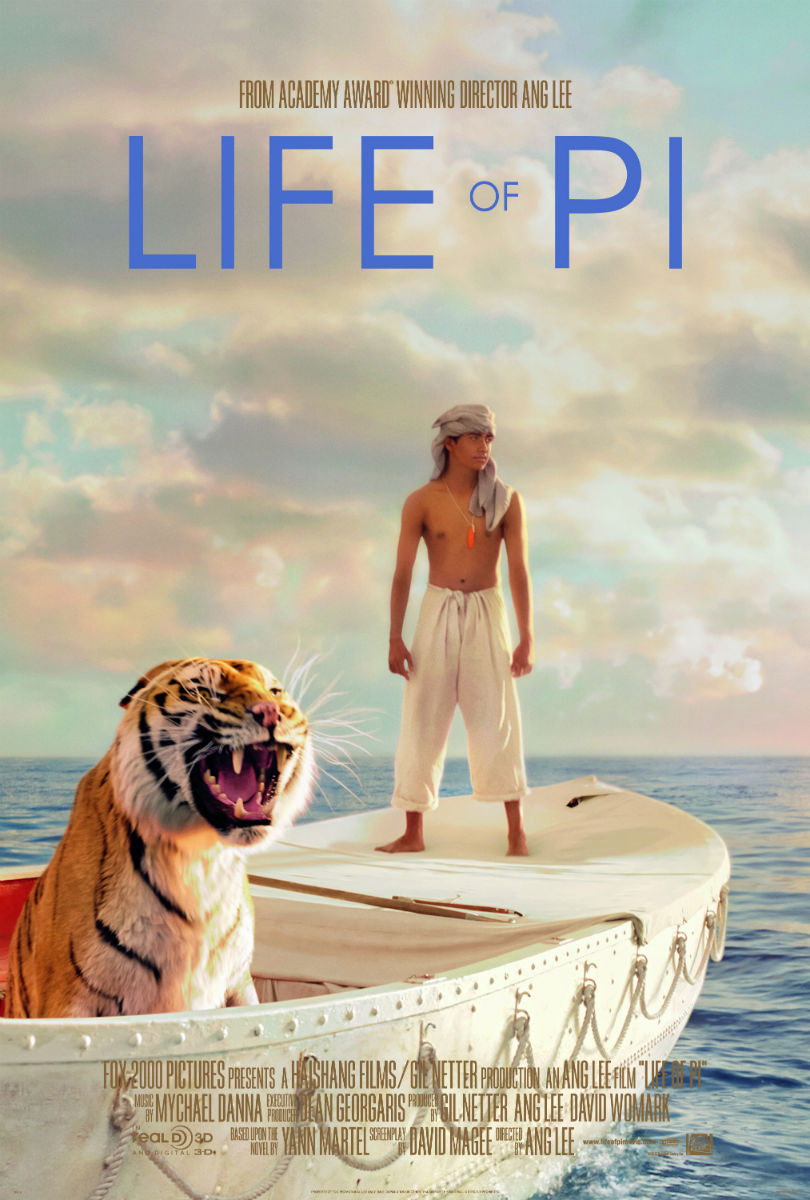
Reasons: This is the only one I could think of that I actually really enjoyed as both a movie and a book (at least at the moment). The movie was just visually spectacular, had a great mythical/fantasy feel that was so pertinent in the book and both were equally devastating at the end. Plus, Suraj Sharma is a hottie and it wasn't bad to look at his face for ~120 minutes.
Day 20
Favourite Romance Book
The Russian Concubine
Kate Furnivall
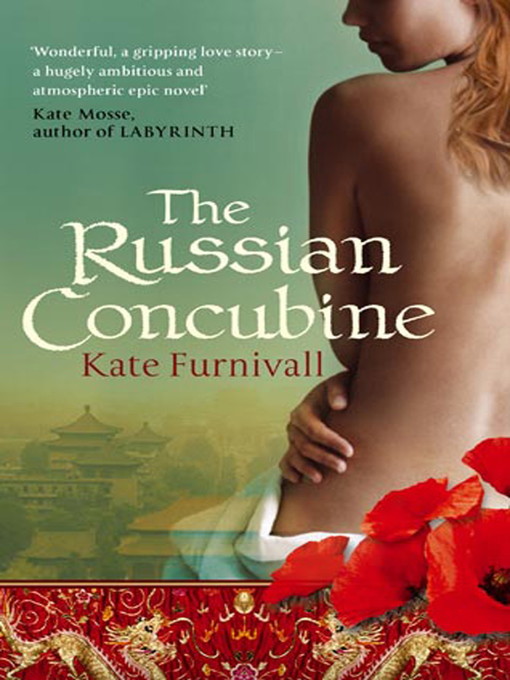
Reasons: I don't read a lot of romance, or books that are classified as mostly romance, so it was a bit hard to pick. I'm not sure if this is classified as mainly romance since it follows a larger narrative than that, but the romance certainly stuck out to me. I liked it because we have a multiracial couple, which is nice to see in literature because it sure as hell happens in real life (like, for example, my own parents) and it took on a part of Chinese and Russian history that I'm interested in, especially the interactions between the two main characters due to different cultures, socioeconomic standing and general gender attitudes at the time.
Day 21
The First Novel You Remember Reading
Little House on the Prairie
Laura Ingalls Wilder

Reasons: I don't have all day to think about this, so I just picked this one. I'm sure if I sat and thought about it for longer, I would have remembered if this was actually the first novel that I truly remember reading (this most certainly isn't it) or if there was a different one (my memory is notoriously bad). My first book was probably an animal book. Although, this book was definitely one of the first novels that I read. I still like it and have fond memories of it, and I remember that I thought living on the prairie would've sucked huge balls, especially since their dad has to make their own house. Ugh!*
Day 22
A Book that Makes You Cry
The Fault in Our Stars
John Green

Reasons: Yeah, it made me cry. Green might've done a bit of emotional manipulation, it's true, but
(show spoiler). Cancer is a bitch and it made me cry like one while I read this book.
Day 23
A Book You Wanted to Read for a Long Time But Still Haven't
A Prayer for Owen Meany
John Irving
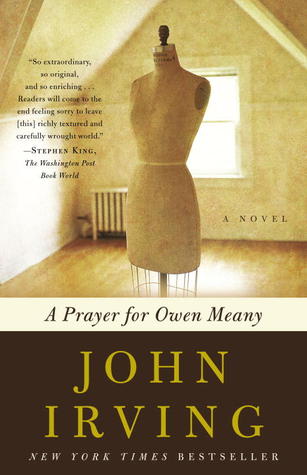
Reasons: This isn't even one of those books that I have on my bookshelf and have been meaning to get to, but keep finding more books to read. No, this is a book that I've been saying I'll read for ~5 years, don't own, have never requested from the library, but have constantly been looking at it in the bookstore every single time I go. Eventually, I'll get to it. (Maybe.)
Day 24
A Book that You Wish More People Would've Read
Flashforward
Robert J. Sawyer

Reasons: I don't mean this in the sense that not a lot of people have read it, but more in the sense that not a lot of people I know in real life have read it. It's a very good book, with a bunch of sci-fi thrown in with actual science-based stuff. It has mystery, multiracial couples again, the LHC and fun time-travel. Even though I know everyone loves John Cho, for all that is science-y, please do not watch the television version. It destroys a well-thought out sci-fi novel with stupid, inconceivable crap.
Day 25
A Character Who You Can Relate to the Most
Arya Stark
from A Song of Ice and Fire series by George R. R. Martin

(credit to rickontheblackwolf via thelittleneedle)
Reasons: I'm actually really empathic towards a lot of characters unless they are the most unrelatable of all (like Bella from Twilight or Karou from Daughter of Smoke & Bone). In relation to Arya, I do not have a noble lineage, I'm not made fun of for my androgyny (because I'm also not a 9-year-old), I've never been caught in a war zone, nor have I been forced to take on multiple identities just to survive. Her story, like all of the Starks, is tragic as fuck, which luckily mine is not. However, I do have a lot of siblings who can annoy the shit out of me, I like sword-fighting and traditionally "non-female" stuff, I did have a bit of PTSD at one point (but not for the same reasons) and I can understand the need to get back to your family. I just wish I had those kind of balls when I was a kid. These aren't even all my feelings on Arya! I could go on about her and the rest of the Starks forever because I love them.
Day 26
A Book that Changed Your Opinion About Something
The Antidote: Happiness for People Who Can't Stand Positive Thinking
Oliver Burkeman

Reasons: You always hear people saying that you should think positive and then everything will get better. Yeah, that never works for me. I feel even more like shit when things don't work out. This book was nice in that I didn't feel like a failure when I couldn't force myself to think positively all the time. It's totally okay to not be positive! I like being a cynic; it makes me feel better when I think humanity is crap and then get proven otherwise.
*I would like to note, in case anyone was on the fence about this, that I was being facetious. I genuinely do not think that prairie lifestyle is terrible and I don't think that building your own house is crappy; I think it's rather commendable and way cooler than anything I've yet to do.
DIY Bookmarks for animal lovers :-)
real-like:
elegant:

eco:

cute:

zoo:

makes me smile & my fav:

The Ecstasy of Rita Joe by George Ryga

I don't want to hear what your father got to say! He's like... like the kind of Indian a white man likes! He's gonna look wise and wait forever... For what? For the kids they take away to come back?
- Jaimie
The Ecstasy of Rita Joe
Act Two
The Ecstasy of Rita Joe is about a young Aboriginal woman who comes from the Caribou Country to the big city and finds herself on trial for numerous charges, like prostitution, theft, etc. She has a certain amount of hours to find people who will vouch for her character or she will go to jail.
This play is written in a very post-modern way, and I've recently discovered that post-modern plays (and post-modern literature in general) are not my favourite kinds of literature. Much like my thoughts on Burning Vision, I didn't like the way this play was arranged. I'm much more of a Shakespeare/Wilde girl in that I like my plays to have acts and scenes that follow in a chronological order that isn't weaving all over the place in dreamscape or memory.
This is a very important play in Canadian literature because it highlights the plight of Aboriginal peoples so well. I definitely agree that it has a very sympathetic perspective on the issues that Aboriginal peoples had and have to deal with in Canada: poverty, alcoholism, stereotypes, racism. Some of the parts are effective in hitting the message home, but other parts were unnecessary. The ending, for example, ultimately made me think that everything was futile; it wasn't important for the story other than to illuminate the racism which was evident throughout the court process.
However, I did enjoy that the Aboriginal characters appeared to be more multidimensional than their white counterparts. It's always nice to have people of colour represented more thoroughly. I also really liked that the good intentions of Mr Homer, a man who does charity work for the First Nations on the reservation, had a bit of the ol' "I'm helping poor people" self-satisfaction rather than actually treating these people as people who deserve respect.
A great look at the issue with white vs. First Nations during the 1960s that is still semi-relevant today. Although, it's not the best or most enjoyable read if you like your plays to be sequential and ordered nicely.
30-Day Book Challenge (Day 15-17)
Day 15
Favourite Male Character
Himura Kenshin (緋村 剣心) from Rurouni Kenshin (るろうに剣心) by Watsuki Nobuhiro (和月 伸宏)

Reasons: This one was kind of hard to pick, I'll admit, and I wavered between putting L from Death Note or Sherlock Holmes instead. But I'm putting Kenshin, so I'm sticking with Kenshin. It's always very hard for me to put my favourite any-kind-of character because I don't really separate them into those kinds of categories and I certainly don't separate them into favourites categories either. I'm choosing Kenshin because I've always liked his morals, his stance on violence, his back story (so sad!) and his personality. His humorous bits are just as engaging as his serious bits. He's the kind of man that you can bring home to your parents, but is also a bit of a bad boy/handsome dark stranger. Plus, he's got that whole scar thing going on, and ladies love the scars.
Day 16
Favourite Female Character
Sango (珊瑚) from Inuyasha (犬夜叉) by Takahashi Rumiko (高橋 留美子)

Reasons: This was also hard to pick as well. Other options for me were Lisbeth Salander, Flavia de Luce and Sansa Stark. I like Sango the most out of all the female Inuyasha characters, but that doesn't mean I don't like the other ones (except I'm really not partial to Kikyou at all). I think Sango is really awesome because 1) she fights youkai for a living, 2) tragic past with family issues, 3) adorable nekomata named Kirara, 4) really cool outfit that doesn't oversexualize her too much, 5) really adept with a bunch of weaponry, and 6) look at that cool bone boomerang! She's also really adorable sometimes and Takahashi does such a great job balancing the fact that she's a young woman with a tragic past living in the Sengoku Jidai era and a teenage girl who experiences all the emotions teenage girls do.
(For the favourite characters, I put both manga-then-anime characters because when you're reading about them for hundreds of chapters and 20+ volumes, it's hard not to get a little attached. I think it's also easier for them to make an impression. I do like non-manga characters and characters from stand-alone novels, but I have a terrible time recollecting them when doing these.)
Day 17
Favourite Quote From Your Favourite Book
from Looking for Alaska by John Green

Reasons: While I don't think Looking for Alaska is my favourite book, I do really like this quote. It's a bit pretentious (man, I hate that word; it always seems like people use that word when they don't have better criticisms) for a teenager, but I feel like teenage-me related (with the genders swapped anyway). Either way, I think it's pleasing to the ear when read aloud and in your head, so there you go.
Congratulations to Eleanor Catton on becoming the youngest person to ever win the Man Booker Prize for Fiction, and by doing it with the longest book.
No, I'm not feeling jealous or inferior at all. Why do you ask?
30-Day Book Challenge (Day 14)
Day 14
Book Turned Movie and Completely Desecrated
Cloud Atlas
Book by David Mitchell; Film by the Wachowskis
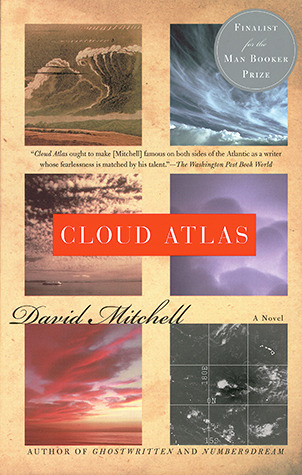

Reasons: I found the movie to be exceptionally boring and incapable of properly handling the themes. I found the yellowface to be tasteless and offensive. The story interwove so often that, even though I had read the book prior to watching it, I was confused. I don't see how someone who'd never read the book could get anything out of that movie. Honestly, I was so bored that a third-way through watching I just had it on as background noise while I did the dishes. Disappointing when the source material is handled so superbly.
30-Day Book Challenge (Day 13)
Day 13
Your Favourite Writer
William Shakespeare

Reasons: I don't really have a favourite writer. There are a few authors where I will buy more than one of their books, but I can't necessarily say that I've read all of the books from those few authors that I bought. I just picked Shakespeare because I love the majority of his plays, I find his poetry stunning and he's actually quite clever. I also focus a lot on Early Modern/Renaissance literature in university, even though I like to read from different periods (but, dear God, not the Restoration!).
Other writers (including manga-ka) whose work I enjoy and that I have read more than one of their books are (in no particular order):
- John Green
- Bret Easton Ellis
- J. K. Rowling
- George R. R. Martin
- E. M. Forster
- Watase Yuu
- Watsuki Nobuhiro
- Takahashi Rumiko
- Alan Bradley
(I think that's a long enough list for now).

 2
2
 1
1









